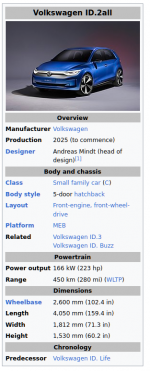There's already a decent number of affordable EVs on today's market, but Volkswagen is working on something that may beat them all on the value scale. As part of its world premiere for the ID. 2all, a new all-electric concept car that costs less than 25,000 euros (~26,522 USD) and features a range of up to 450 km (279 miles), Volkswagen confirmed that it is developing an electric car that can be purchased for less than 20,000 euros (~21,217 USD). The production version of the ID. 2all is one of ten new electric models that Volkswagen plans to launch by 2026, while this year alone will see the introduction of the new ID.3, the ID. Buzz with long wheelbase, and the ID.7. Tesla's cheapest EV, the Model 3, is listed for $42,990 on its official website.
See full article...
See full article...



